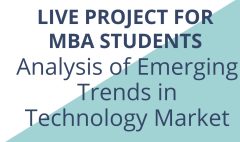Strategic Educational Leadership
Strategic Educational Leadership
Discover how MBAs are revolutionizing educational leadership, driving strategic change, and fostering institutional success. Elevate your career with key insights here!
In the dynamic landscape of education, institutions face the imperative of evolving to meet emerging challenges and opportunities. Within this milieu, MBA graduates are uniquely positioned to drive transformative change, leveraging their strategic acumen to foster institutional success. At the intersection of business strategy and educational innovation, these leaders are redefining norms and setting new benchmarks for excellence.
Strategic Leadership: A Keystone of Educational Advancement
Strategic leadership goes beyond the confines of traditional administration, demanding foresight, adaptability, and a visionary approach. In educational settings, this translates to creating scalable solutions, optimizing operational efficiencies, and navigating the complexities of academic ecosystems. MBA graduates, with their dexterity in strategic planning and execution, are well-equipped to helm these initiatives, steering educational institutions toward a trajectory of sustainable growth and success.
Cultivating a Culture of Excellence
The ambiance of an educational institution is pivotal to its success. Strategic leaders, with their MBA toolkit, can instill a culture of continuous improvement, accountability, and excellence. They achieve this by setting clear expectations, establishing robust feedback mechanisms, and fostering an environment of mutual respect and collaboration. This cultural paradigm shift is fundamental for institutional success, influencing student outcomes, staff satisfaction, and overall institutional reputation.
Data-Driven Decision-Making
In the age of information, data is a critical asset. MBA graduates bring to the table sophisticated analytical skills, enabling educational institutions to harness data for informed decision-making. From student performance analytics and operational metrics to financial assessments, strategic leaders utilize data to identify opportunities for improvement, measure the impact of interventions, and guide the institution’s strategic direction.
Change Management and Innovation
The educational sector is perpetually evolving, with new pedagogical models, technological advancements, and global trends reshaping the landscape. MBA-equipped leaders are adept at change management, capable of guiding institutions through transitions with minimal disruption and maximum buy-in. Their innovative mindset also means they’re continually seeking ways to enhance processes, incorporate new technologies, and adopt cutting-edge educational methodologies.
Stakeholder Engagement and Communication
Effective leadership is synonymous with proficient communication. Strategic leaders in education are skilled in engaging diverse stakeholders, including students, faculty, parents, and community partners. They excel in transparent communication, conflict resolution, and consensus-building, ensuring all voices are heard and valued in the decision-making process.
Continuous Professional Development
The journey of an educational leader is one of lifelong learning. There are several resources and platforms for continuous professional development:
- Harvard Business Review (HBR): A leading resource offering insights on leadership, organizational change, and strategy ( https://hbr.org/)
- Association for Supervision and Curriculum Development (ASCD): Provides professional development plans, conferences, and community programs for educational leaders (http://www.ascd.org/)
- Coursera: Offers online courses in educational leadership and administration from top universities ( https://www.coursera.org/)
- EdX: Provides courses focused on education leadership, policy, and change management ( https://www.edx.org/)
Conclusion
MBA graduates are transforming the educational landscape, bringing a fresh perspective, strategic expertise, and a commitment to excellence. Their leadership is not just about maintaining the status quo but about driving strategic change that will shape the future of education.








